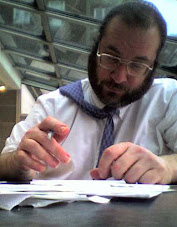This week’s parsha begins with the most central of all texts in the Torah for pastoral care – the appearance of God to Avraham at the Oaks of Mamre.
And HaShem appeared to him by the Oaks of Mamre. And he was sitting in the tent door during the heat of the day. (Gen. 18:1)
The Talmud asks, why does it say the heat of the day? It answers, that “the heat of the day” informs us that this was the third day after Avraham’s circumcision and that God came to visit with the suffering Avraham and ask after his health. (Bava Metzia 86b)
Elsewhere (Sotah 14a), the Talmud adds that this text teaches us that we should visit the sick, just as God visited Avraham in his illness at the Oaks of Mamre. We need to follow God's example, the Talmud says.
The verse also teaches us something important about how we should carry out this command to visit the sick. As the Hezkoni points out, this is the only place in the Torah where the word וירא/VaYeirah (and [God] appeared) occurs where God doesn’t say anything afterwards (like with Moses at the Burning Bush). There is a great lesson for us here – just as God comforted the ill without saying anything, so too we can comfort the ill in silence, with our mere presence.
That is not to say that we should not talk with an ill person when we visit them. But, too often we feel crippled – sometimes so much so that we are afraid to visit the sick person at all – by feeling an obligation to speak. We think if only we had the right words we can help or heal a person. The silence of God in this verse frees us from feeling this crippling obligation. It lets us know that our mere presence is more than enough.
*******************
The Midrash (which Rashi cites) further connects our verse to the need to not only visit the sick, but to care for all the needy and unfortunate.
What does it mean that Avraham was “sitting”, asks the Midrash? It answers, God told Avraham to sit, while God remained standing, as a sign to Avraham that one day God would stand in judgment over the world while Avraham's descendents had the privilege of sitting.
The Midrash finds this image of God standing in judgment in Psalm 82, which begins, "God stands in God's congregation; among the judges, God judges."
The Psalm continues:
Save the poor and the needy; from the hands of the wicked, rescue them. (Psalm 82:2)
In my work in the hospital, in the prayers I offer to the ill and to their families, a central piece of my plea is indeed kuma – a plea for God to rise. To rise and be with us as in the days of old. To bring comfort and peace and justice. Be with us as you were for Avraham. As you were for Yitzhak and Yaakov. Be with us as you were for King David. Do not forget us.
What can give such a prayer such power for me is that it is not just for me. It is not just for the patient. . . . In those incredible moments when true intention rises in my heart and tears come to my eyes, the cry for God to rise is indeed for me. And it is indeed for the patient. And it is also very much for the world as a whole. For all people. In that moment, a link happens. We are not alone. We are all linked together. And to what is eternal.
This is what the pastoral care we are commanded to do in this first verse of our parsha is all about. When we visit the sick – when we follow the commandment of bikur holim/ביקור חולים – we are not merely serving the ill person in the room. We are affecting the whole world. We are pleading with God for justice and for peace, for the dream we are promised of a world of wholeness and peace. And we are doing much more than just pleading for it. We are making it true. We are walking in the ways of God.
May your week be one of peace. And one of justice.
__________________________


No comments:
Post a Comment